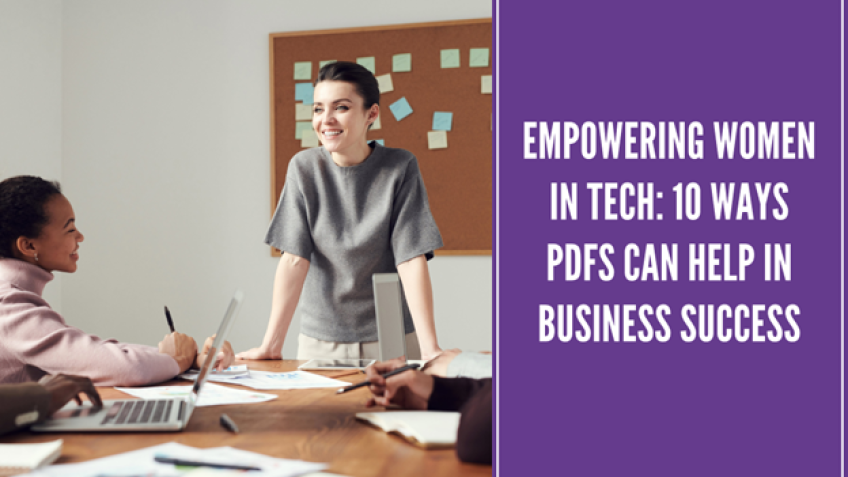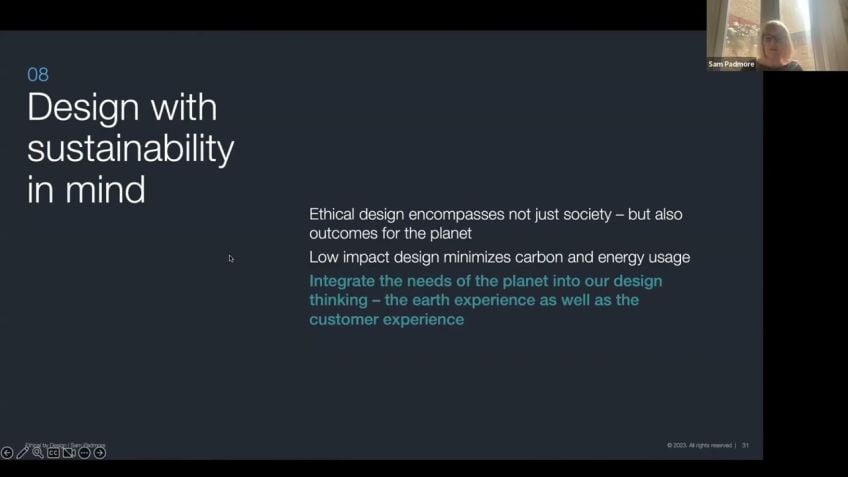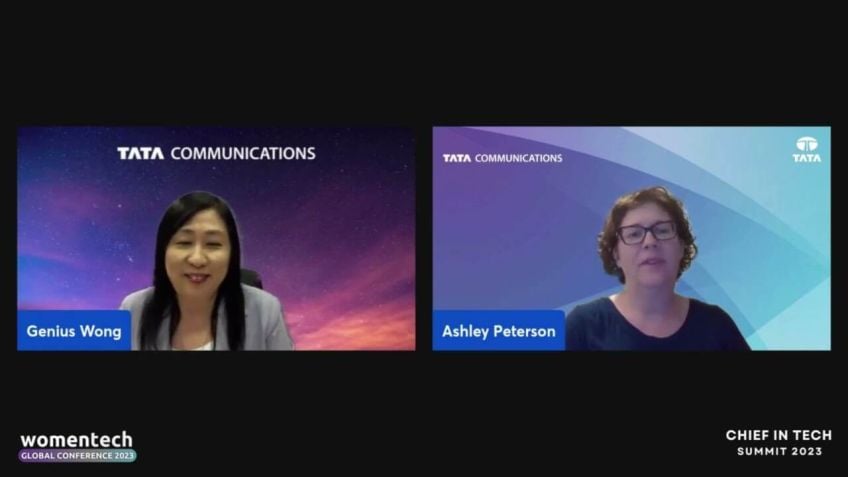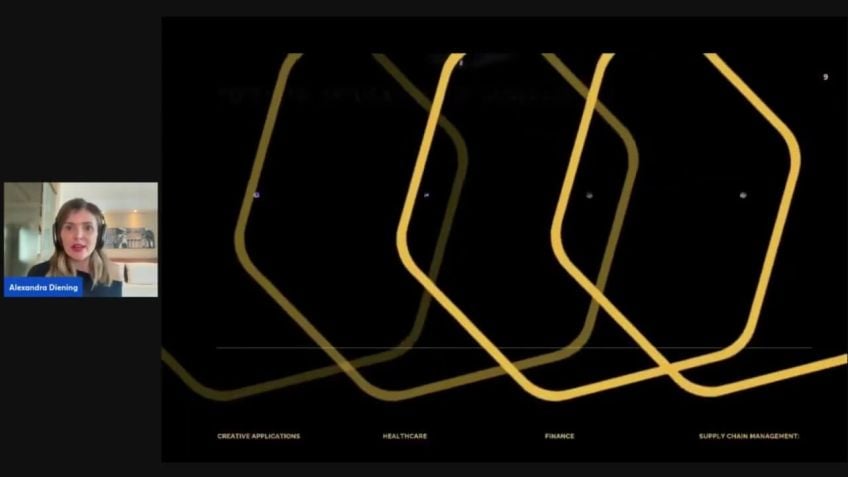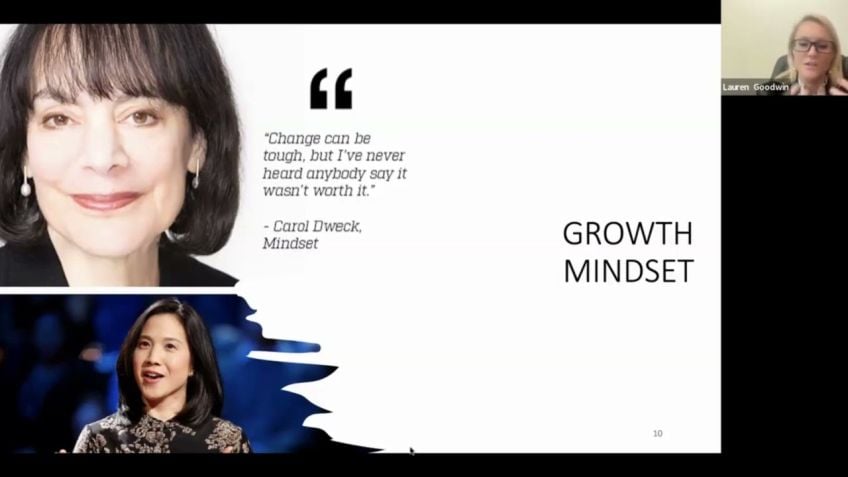Paula Petcu at WomenTech Global Awards 2020
Meet Paula Petco: Blazing a Trail in Digital Health Tech
Stepping into the world of tech doesn't just mean programming or web development. It's a universe filled with countless roles and opportunities for innovation. One such innovator shaping the future of tech is Paula Petco, the head of Digital Technologies at Loom back. This inspiring tech leader, named one of 2018's Top 100 talents in Denmark under the age of 35, shares her journey and insights about navigating the intricate landscape of technology.
Discover, Inspire, Engage: Paula's Approach to Tech
Paula's work is guided by three principles - Discover, Inspire, and Engage. Beginning her career in Romania, she moved to Denmark to obtain her master’s in computer science, an experience that widened her perspectives, honed her adaptation skills, and opened new professional opportunities. Her journey is marked by a series of accomplishments that distinctly highlight these principles.
- Discover: For Paula, it wasn't always clear what her precise role would be in the tech industry. However, she kept an open mind and discovered exciting opportunities like building a search engine for clinicians and venturing into enterprise search solutions.
- Inspire: Paula took inspiration from her mother, a shining example of being able to balance a professional life with family. Now, she leverages her journey to inspire others, encouraging them to challenge themselves and embark on a path of continuous learning.
- Engage: Paula firmly believes in taking action. As a firm advocate of diversification in the tech space, she’s not only raised awareness of the issue but also taken actionable steps to improve representation.
Shattering Stereotypes in Tech: Paula's Quest
One of Paula's notable undertakings is her YouTube channel where she shares her own tech projects to inspire others, particularly women, to get involved in tech creation. Despite feedback highlighting the disproportionate male to female ratio among her audience, she uses this to fuel her determination to balance the scales, acknowledging every small win along the way.
Driving Change: Paula's Call To Action
Motivated by an ambition to improve the tech landscape, Paula firmly believes in the necessity for change at multiple levels—individual, organizational, regulatory, and systemic. While she acknowledges the strides that have been made towards better representation, she underscores the need for continuous active engagement from everyone in the tech community. She also emphasizes the importance of networks like Women Tech Network in unitifying tech women and creating an amplification platform for their voices.
Final Thoughts: Inspiring Future Tech Leaders
Paula’s story underscores that the best way to predict the future is to create it—something she continues to embody in her path-breaking work. Her parting advice to budding women in tech is to always ask for what they want, follow their passions, drive fair practices, and strive to become leaders of change. As we navigate the ever-evolving tech space, tales like Paula's stand testament to the potential women hold in shaping the future of technology.
Video Transcription
So everyone, we are going further with another amazing speaker. I'm super excited to introduce Paula Petco head of Digital Technologies at Loom back. She was named one of the one H 2018 top 100 talents in Denmark.Under the age of 35 she started as a consultant specializing in an enterprise surgeon at find wise, then worked with the process and analyze, analyzing clinical and omics data at Lund Back, an international pharmaceutical company. Currently she's doing in activities for implementing digital health technologies in clinical trials.
Please welcome on the stage, Paula Discover, inspire, engage the stage is yours. I will be back for some Q and A s if you have time. Enjoy.
Thank you Anna and thank you everyone for um having me here at this conference. It's a pleasure to uh join you and uh be part of celebrating all the wonderful women in uh tech. It's great to see this and great to see also so many attendees from different sides of the world. My presentation today will actually focus on um sharing some highlights from my uh personal experience. Um And uh since I believe uh that life is some way AJ a journey of discovering ourselves and discovering the world. Uh My, my presentation is focused on discovering, inspiring and engaging. Um So I hope that uh I can share some of my personal highlights uh in from my career, um inspire you to take action and to hopefully start a discussion on how we can get more things done. So if you look at the discover, sharing my story a bit in the hope to inspire you. I originally come from Romania. Uh but I moved to Denmark to finish my master's education. And it's really important to say that I started with uh computer science back in Romania. I was likely influenced also by uh the, the ones around me, especially my mother who has uh been a role model for me showing that yes, you can have a family and also be a successful woman uh in, in the professional world as well.
Um So that showed me, OK. Yes, that's a nice role model. There is no pressure on me to not choose what I really want to do. And that was working with computers. But then for my masters, I went to Copenhagen to finish my uh masters studies and continue my education in computer science. And that was a very smart move. Looking in retrospect since that meant uh getting familiar with the new culture, uh new types of working the educational system in Romania and Denmark, they're quite different. Uh So it was uh quite a journey to, to be able to challenge myself, um challenge the skills that I have my ability to adapt to new situations and new cultures, learn a new language. Um And also to uh to be able to understand what new career possibilities uh are for me in uh in Denmark. And uh definitely it uh it proved that there are so many things uh that I could do more here uh in Denmark than New Romania. So I'm still here. Uh When I worked on my um master thesis here in Copenhagen, I actually worked on building a search engine for uh helping clinicians identify difficult medical cases. Um And that was an idea that came from my supervisor at that time.
Um But also it was uh a quite amazing project that really showed me that I can combine my computer science skills uh and apply those in the healthcare domain. It was quite impressive when uh we got a lot of coverage from mit technology review, other publications and also recognition from clinicians and patients that they are using the solution that I contributed with. And uh and this was a very nice push for me to, to see that I can definitely do uh more than what I was taught in school. Uh There's value that I can add using um a solution, software solutions and combine data and technology to bring value. So after that, I started uh working as a consultant. And to be honest, when I was young, uh I guess even before university, just hearing about the role of a consultant, uh it, it sounded like it was someone with many years of experience, like probably over 50. So I couldn't have, couldn't have imagined myself as a, as a consultant. Uh But then after graduating, I actually started working at Find Life, uh which is a company working with uh providing enterprise search solutions for companies. And I was, I have to say I was fortunate to have uh great managers and great colleagues uh to give me the opportunity to develop myself as a new graduate. I of course, had a lot of things to learn.
But I if I were to give some advice to someone that is looking for for a challenge, becoming a consultant is a great choice, you learn a lot of things in very short time. Uh Fast forwarding to where I'm now. Uh I'm currently heading the digital technologies team at Lundbeck. Um And as Dana mentioned, Lundbeck is a pharmaceutical company. Um And uh we're working on finding better treatments for patients with brain diseases. I started as a, as a data analyst in the company and then move through different roles. Um But the roles that I had uh over time, I couldn't have imagined those. Uh for example, data scientists, I couldn't have imagined those while I was in university. To be honest, because that was not uh the field, the role wasn't defined yet. Um So I, I saw the presentation that uh Catherine Torrington gave uh uh some time before and I totally agree with, with her, like for her career path, mine was like that as well that it wasn't all planned out. Um uh She hasn't planned to go into space when she was little. I didn't plan to become a data scientist or, or manager as I am now.
Um But uh I think knowing what drives me um And that I can put my trust in my ability to adapt uh may be really successful so far. And also makes me think that I can be part of defining the future and defining my future role. Um In addition to that, I'm also playing a bit with the idea of um uh working as an entrepreneur in a start up called Healthy Mind Tech. Um And we are three people, uh two thirds women. Uh I am the CTO such uh making things happen person in the company. Um And uh this is something that I'm doing in my free time. We recently participated in a competition with accenture on using A I Solutions for mental health. Um And I can say that uh we were among the four finalists. Uh but all of the four finalists, I was the only woman uh actually representing the company. Um And I actually looked also on the website for women in tech network on the stats that you, you have. And it's quite uh incredible to see uh the low percentages of the representation of women in technology. So we can definitely do more. Um And the way that I hope to inspire people um is to show my work and share the learnings that I have around uh five years ago. Um I started playing uh with Arduino. That's uh something that I haven't done before trying to go into hardware.
I'm a computer scientist, so I'm used to sitting in front of the computer and coding. Not much to, to uh take computers apart and look what's inside and build them back again. However, uh around five years ago, I discovered that I can combine my software engineering skills with something physical that I can build something not only an app or uh a software product for, for a company, but I can actually build something that, that I see in my hands and it's also useful.
I started with Smart Home. Uh But now uh I'm sharing all my uh projects um online uh in the hope that I inspire others and share ideas with others and learn from them as well because this is a journey of uh of learning. Um And in addition to, to this, this challenge of putting my workout in video format, it was an extra challenge for myself um to actually get more comfortable with my voice and speaking on camera. Uh which for someone who hasn't done that before and you hear your voice for the first time, it can be quite uh difficult. So, uh this has pushed me forward in uh in my ambition to, to be more visible. And my current project is actually working on a humanoid robots. And so I went from small devices with sensors in, in my home. Now I'm building a full size humanoid robot. Uh And uh here, I'm uh developing my skills in also electronics, but also mechanics and uh better understanding the human body. So bought myself a big book for anatomy and trying to understand how we work basically. And I think another aspect of this that is quite interesting um is exploring the gender uh uh attribution for robots. A lot of the assistance that we have in our home, like uh the Google home or Alexa and, and so on.
Uh by default, they have a woman voice. Why is that? Um And for some time, you couldn't even change that. So that was a default and the only option um now they've relaxed that a bit. Uh But why is that there is some bias there? And also if you look at uh all the other projects on humanoid robots and who's building them, it's mainly dominated by uh male makers uh creating uh female shaped uh robots. So I'm exploring uh what does it take to create a humanoid robot, but also what exists, how do we find gender? Should there be a gender for the robots and exploring also the the arts of, of making such a of creating something from scratch? Um If we look at my uh youtube channel, just to give you a, a sneak peek um on the status of my, my audience, you will see that it is definitely male dominated. Uh Only 10% of my audience is uh female. Um I don't think that's something uh different than other uh makers that put their projects on youtube. Uh But I always feel very proud when I'm looking at the, at the comments. Um And I see uh comments from uh my uh female audience uh asking questions and uh providing feedback and interacting with uh with the content I put uh up there. So that's very, very encouraging. Um But definitely can do more. This is, this is definitely not enough.
Um So what can we do? Um how we can uh be more involved and participate into uh what's happening? Um I'm a get things done person. So uh I have some specific ideas that I would like to share with you. Um And then I would like to open for discussion if we have time to get your feedback um and ideas on, on how we can move uh this field forward. Um So I think in terms of what we uh can do and what we need to do, there are certain changes we can make ourselves. And I think we had some really good presentations uh today from the other speakers uh on uh what we can do for ourselves uh to just ask for what you want, uh see yourself where you want to be um do what you're curious about. Don't just do what the others tell you find that passion uh and, and go for it. If you are doing something that you're not passionate about, you're more likely to fail. And there are changes we can do for others um to inspire and especially as leaders, we have a responsibility to not only inspire but to ensure fairness and diversity in the workplace and be the drivers for change.
In addition to these networks such as this one that we are part of now, um are really important to show that uh we still have a problem. I'm also part of some other networks and uh sometimes people are like, why is this a network only for women? It's pretty simple, simple because there's still a problem and it needs to be solved. Uh So we need to uh come together and work on a solution until the problem is not solved. Then we will need these networks. And the last part, I think it's, it's, we need some changes in the organizations and countries by laws and regulations that uh promote equal pay and paid parental leave. Um Having to choose between having a family or a successful career that should not be a question. Um Maybe COVID does uh influence a bit, the number of uh hours uh that one can work from home, have more flexibility, but there is definitely more work to be done. Um And I can say here that I'm um uh privileged. I, I recognize that I'm privileged in a way to be living in a country such as Denmark that promotes many of these things. Um But uh it's not perfect. There is work to be done with these thoughts in mind. I would just like to leave you with my uh favorite uh, quote. Um And that the best way to predict the future is to have it. I love it.
The best way to predict the future is to hack it. I love it more power to you. I really love what you're doing. And thanks for the kind words about women tech network and the other women tech focused network out there, the more networks like ours and others, the more we can empower support and encourage women to go in tech, to stay in tech and to make an impactful job
just like you do Carl. Exactly.
Thank you very much for this great presentation. Unfortunately, we don't have time for Q and A s, but we'll be glad to have you as a speaker more at our events. And uh what is the best way to connect with you? You showed your youtube channel. So people can follow you through the youtube channel and stay tuned for your cool
videos. Yeah, thank you very much. Thanks
Paula. Have a nice day. Stay with us.
Bye bye.

